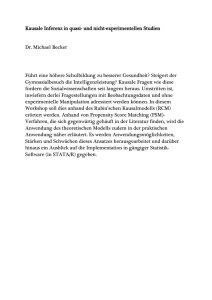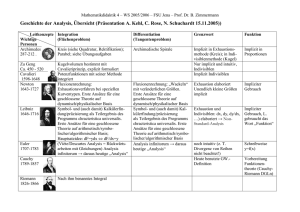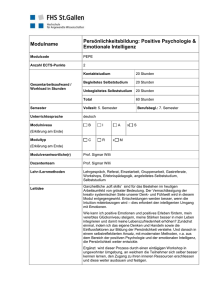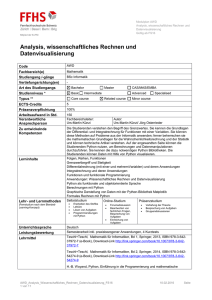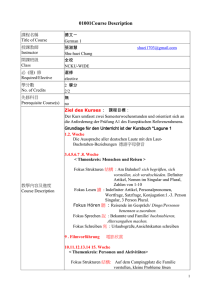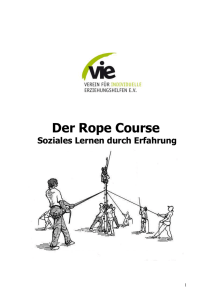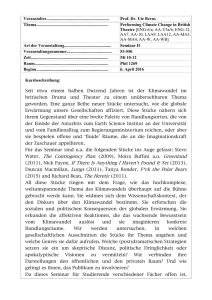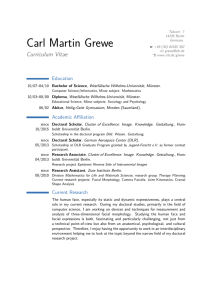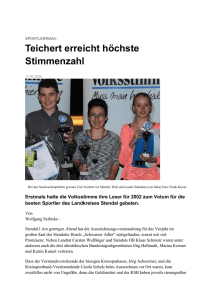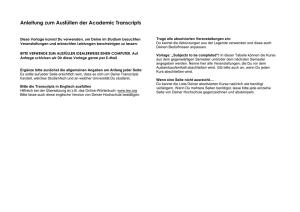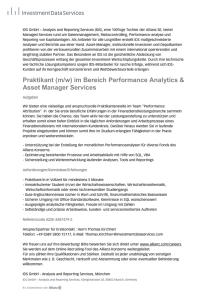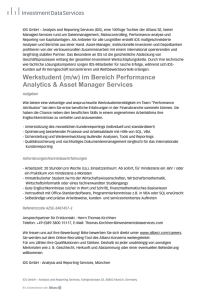Kursangebot SoSe 2015 - Fakultät WiSo
Werbung
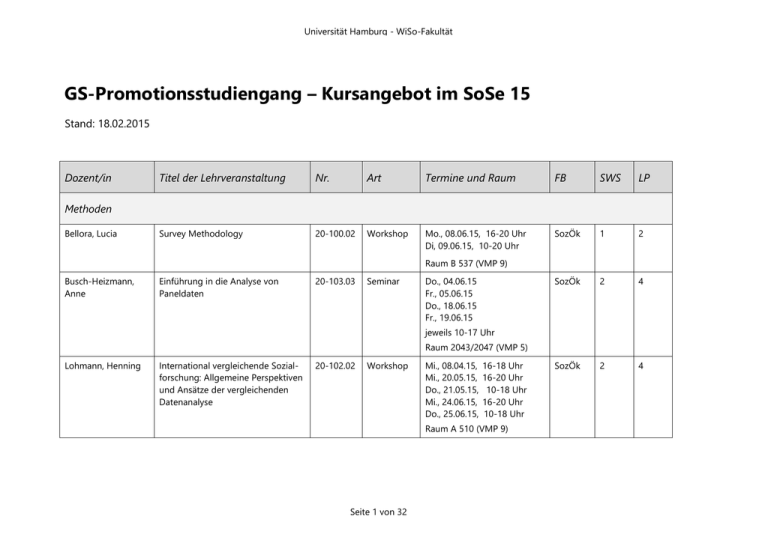
Universität Hamburg - WiSo-Fakultät GS-Promotionsstudiengang – Kursangebot im SoSe 15 Stand: 18.02.2015 Dozent/in Titel der Lehrveranstaltung Nr. Art Termine und Raum FB SWS LP Survey Methodology 20-100.02 Workshop Mo., 08.06.15, 16-20 Uhr Di, 09.06.15, 10-20 Uhr SozÖk 1 2 SozÖk 2 4 SozÖk 2 4 Methoden Bellora, Lucia Raum B 537 (VMP 9) Busch-Heizmann, Anne Einführung in die Analyse von Paneldaten 20-103.03 Seminar Do., 04.06.15 Fr., 05.06.15 Do., 18.06.15 Fr., 19.06.15 jeweils 10-17 Uhr Raum 2043/2047 (VMP 5) Lohmann, Henning International vergleichende Sozialforschung: Allgemeine Perspektiven und Ansätze der vergleichenden Datenanalyse 20-102.02 Workshop Mi., 08.04.15, Mi., 20.05.15, Do., 21.05.15, Mi., 24.06.15, Do., 25.06.15, 16-18 Uhr 16-20 Uhr 10-18 Uhr 16-20 Uhr 10-18 Uhr Raum A 510 (VMP 9) Seite 1 von 32 Universität Hamburg - WiSo-Fakultät Dozent/in Titel der Lehrveranstaltung Nr. Art Termine und Raum FB SWS LP Meyer-Gohde, Alexander Estimation and Solution of DSGE Models: Application to Labor Search Models 20-101.03 Seminar Fr., 10.04.15, 09-17 Uhr Fr., 08.05.15, 09-17 Uhr Fr., 26.06.15, 09-17 Uhr VWL 2 4 SoWi 2 4 SoWi 2 4 Raum 1077 (VMP 5) Pfau-Effinger, Birgit Process Tracing and Social Mechanisms in Social Sciences 20-101.04 Seminar Mittwochs, jeweils 10:1511:45, 15.04.15 06.5.15 20.05.15 10.06.15 24.06.15 02.07.15 Blockseminar: Mo., 29.06.15, 14-18 Uhr Di., 30.06.15, 09-18 Uhr Raum B 136 (VMP 9) Schnapp, Kai-Uwe Stata für Ein- und Umsteiger 20-108.03 Seminar Mo., 07.09.15, 10:30-16 Uhr Mi., 09.09.15, 09-15 Uhr Do., 10.09.15, 09-15 Uhr Fr., 11.09.15, 09-15 Uhr Raum A 514 (VMP 9) Seite 2 von 32 Universität Hamburg - WiSo-Fakultät Dozent/in Titel der Lehrveranstaltung Nr. Art Termine und Raum FB SWS LP Stempfhuber, Martin Schweigsamkeit oder Geschwätzigkeit des Sozialen? Methoden und Techniken der qualitativen Sozialforschung 20-105.03 Seminar Donnerstags, jeweils von 14:00 bis 16:00 Uhr SozÖk 2 4 SozÖk 2 4 02.04.15 09.04.15 16.04.15 23.04.15 30.04.15 07.05.15 Blockseminar: Do., 02.07.15, 14-20 Uhr Do., 09.07.15, 14-20 Uhr Raum B 136 (VMP 9) Teichert, Thorsten Informetrische Ansätze von Literaturanalyse 20.101.05 Workshop Mo., 13.04.15, 09-18 Uhr Mo., 18.05.15, 09-13 Uhr Di., 19.05.15, 09-18 Uhr Mo., 06.07.15, 09-13 Uhr Di., 07.07.15, 09-18 Uhr Raum A 510 (VMP 9) Seite 3 von 32 Universität Hamburg - WiSo-Fakultät Dozent/in Titel der Lehrveranstaltung Nr. Art Termine und Raum FB SWS LP Family Economics 20-201.12 Seminar Mo., 13.04.15, 09-18:15 Uhr Di., 14.04.15, 10-18:30 Uhr Mi., 15.04.15, 08:30-12:30 Uhr SozÖk 2 4 SozÖk 2 4 SozÖk 1 2 Theorien Beblo, Miriam / Korn, Evelyn (Univ. Marburg) Raum B 136 (VMP 9) Busch, Timo / Stinchfield, Bryan (Franklin & Marshall College, Lancaster, USA) Heise, Arne Corporate Strategy and Organizational Performance (Paper Development Workshop) 20-201.24 Workshop Do., 11.06.15, 18-20 Uhr Fr., 12.06.15, 10-18 Uhr Sa., 13.06.15, 10-18 Uhr Raum steht noch nicht fest. Advances in Macroeconomic Theory and Policy 20-201.25 Workshop Mi., 29.04.15, 11-17 Uhr Mi., 20.05.15, 11-17 Uhr Mi., 17.06.15, 11-17 Uhr Raum 2.16 (Welckerstr. 8) Seite 4 von 32 Universität Hamburg - WiSo-Fakultät Anmeldungen: Anmeldungen zu den Kursen sind möglich über „Geventis“ in folgenden Zeiträumen: a) 18.02.15 (10 Uhr) bis 19.03.15 (13 Uhr) für folgende Kurse: - International vergleichende Sozialforschung (Lohmann) - Esimation and Solution of DSGE Models (Meyer-Gohde) - Process Tracing and Social Mechanisms in Social Sciences (Pfau-Effinger) - Schweigsamkeit oder Geschwätzigkeit des Sozialen? (Stempfhuber) - Informetrische Ansätze von Literaturanalyse (Teichert) - Family Economics (Beblo/Korn) - Advances in Macroeconomic Theory and Policy (Heise) b) 18.02.15 (10 Uhr) bis 20.04.15 (13 Uhr) für folgende Kurse: - Survey Methodology (Bellora) - Einführung in die Analyse von Paneldaten (Busch-Heizmann) - Corporate Strategy and Business Practice (Busch/Stinchfield) c) 18.02.15 (10 Uhr) bis 06.07.15 (13 Uhr) für folgenden Kurs: - Stata für Ein- und Umsteiger (Schnapp) Seite 5 von 32 Universität Hamburg - WiSo-Fakultät Kursbeschreibungen Bellora, Lucia: “Survey Methodology” The course aims at (1) preparing graduate students to answer research questions with the survey methodology and (2) enabling graduate students to evaluate survey-based research. Starting from the predictive validity framework, the course teaches how to safeguard interrater reliability, convergent and discriminant validity when designing questionnaires. Besides sample selection methods, techniques for writing and evaluating survey questions and for questionnaire construction are discussed. Furthermore, the course teaches ways to reduce coverage and sampling error during the survey conduction. Finally, the peculiarities of surveying businesses are delineated. The course is designed as a workshop. Graduate students are therefore required to hand in and present their own survey-based research projects. Seite 6 von 32 Universität Hamburg - WiSo-Fakultät Busch-Heizmann, Anne: “Einführung in die Analyse von Paneldaten” In dem anwendungsorientierten Seminar werden multivariate Verfahren der Analyse von Längsschnittdatensätzen am Beispiel des Sozio-oekonomischen Panels (SOEP) vorgestellt und in praktischen Übungen mit dem Statistikprogramm Stata vertieft. Nach Erörterung des Datenaufbaus von Paneldatensätzen werden verschiedene Analysemethoden von Paneldaten erarbeitet (ClusterRegression, Fixed-Effects-Regression, Random-Effects-Regression, Hybrid-/Mundlak-Modelle) und auf konkrete sozialwissenschaftliche Forschungsfragen angewendet. Voraussetzung für eine erfolgreiche Teilnahme sind grundlegende Kenntnisse in der Anwendung von Stata sowie Kenntnisse der linearen Regression. Seite 7 von 32 Universität Hamburg - WiSo-Fakultät Lohmann, Henning: “International vergleichende Sozialforschung: Allgemeine Perspektiven und Ansätze der vergleichenden Datenanalyse“ Veranstaltungskurzbeschreibung (SS 2015) Titel: International vergleichende Sozialforschung: Allgemeine Perspektiven und Ansätze der vergleichenden Datenanalyse English title: Comparative social research: General perspectives and approaches to comparative data analysis (on request the course will be given in English). Dozent: Prof. Dr. Henning Lohmann, [email protected], Tel. 040/42838-8494, Raum 2.08 (Welckerstr. 8) Veranstaltungsart und –turnus: Blockseminar, organisiert in Vorbesprechung/Einführung und zwei weitere Blöcke Veranstaltungsbeschreibung Die Veranstaltung bietet einen anwendungsorientierten Überblick über die Zielsetzungen und Möglichkeiten international vergleichender Sozialforschung. Ein Schwerpunkt liegt auf der quantitativen Analyse von Surveydaten aus europäischen Ländern. Die Veranstaltung gliedert sich inhaltlich in drei Teile: Seite 8 von 32 Universität Hamburg - WiSo-Fakultät 1. Allgemeine Perspektiven der international vergleichenden Sozialforschung: Zur Methode des Vergleichs, Länder als Fälle und Merkmalsträger, Auswahl von Ländern und small-n-Problem, Makro-/Mikro- und Mehrebenenperspektive 2. Datenverfügbarkeit und Datenqualität: Makrodaten, internationale Umfrageprojekte 3. Datenanalyse: Regressionsanalysen mit hierarchisch gegliederten Daten (z.B. Länder – Personen, „Mehrebenenanalyse“) Der Ablauf des Seminars ist wie folgt: 1. Einführung und Überblick (2 Std.) 2. Allgemeine Perspektiven der international vergleichenden Sozialforschung, Regressionsanalysen mit hierarchisch gegliederten Daten I (12 Std., Seminar und Anwendung) 3. Auswahl von Ländern und Datenverfügbarkeit/-qualität, Regressionsanalysen mit hierarchisch gegliederten Daten II (12 Std., Seminar und Anwendung) Schwerpunkte der Veranstaltung können bei Anmeldung bzw. bei der Vorbesprechung abgestimmt werden. Course outline The course provides an overview of the objectives and potentials of comparative social research. Emphasis is laid on the applied quantitative analysis of European survey data. The seminar covers the following topics: 1. General perspectives of comparative social research: comparative method, cases and variables, country selection and small-n problem, macro-, micro- and multi-level perspective 2. Data availability and data quality : macro data, international survey data 3. Data analysis: regression analysis with hierarchical data (e.g., countries – individuals, “multilevel analysis”) using Stata The seminar is organized as follows: 4. Introduction and Overview (2 hours) 5. General perspectives of comparative social research, regression analysis with hierarchical data I (12 hours, classroom and lab session) Seite 9 von 32 Universität Hamburg - WiSo-Fakultät 6. Country selection and data availability/quality, regression analysis with hierarchical data II (12 hours, classroom and lab session) Detailed topics will be discussed in the first session. If you have questions please send me a mail. Seite 10 von 32 Universität Hamburg - WiSo-Fakultät Meyer-Gohde, Alexander: “Estimation and Solution of DSGE Models: Application to Labor Search Models” The course is based on techniques and applications and explores the importance of the labor market in macroeconomics using a variety of methodological tools. It is designed to develop and sharpen students’ prior knowledge dynamic macroeconomics and econometrics with a mixture of lectures on state-of-the-art solution and estimation techniques for macroeconomic models and application of the techniques to search theory with standard software packages and models from the literature. Course Outline 1. Introduction Concepts/techniques: Data filtering, DSGE linearized difference equations Main readings: King and Rebelo (1993), Shimer (2005), Uhlig (1997) sec. 3 Additional reading: Hamilton (1994) ch. 1 2. Baseline Search and Matching Model Concepts/techniques: Intertemporal optimization, search and matching Reading: Merz (1995) 3. Root Finding Methods, Linear Solution Methods Concepts/techniques: Bisection, Newton-based methods, eigenvalue methods Reading: Judd (1998) ch. 5, Uhlig (1997) sec. 6 and 7 Additional readings: Fernández-Villaverde (2010) sec. 4.1 4. State Space and Likelihood Function Concepts/techniques: Kalman filter, likelihood function Main reading: Fernández-Villaverde (2010) sec. 4.2 Seite 11 von 32 Universität Hamburg - WiSo-Fakultät Additional reading: Hamilton (1994) ch. 13.2 and 13.4 5. Estimation Methods and Model Analysis Concepts/techniques: Maximum likelihood, Bayesian methods, Markov Chain Monte Carlo, Diagnostics, Model Comparison Main reading: Fernández-Villaverde (2010) sec. 4 and 5 Additional reading: An and Schorfheide (2007) sec. 3 and 4 6. Nonlinear Methods Concepts/techniques: Perturbation, Particle Filter Main reading: Fernández-Villaverde (2010) sec. 4.2.2 and An and Schorfheide (2007) sec. 6 Additional reading: Lan and Meyer-Gohde (2013), Schmitt-Grohé and Uribe (2004) Seite 12 von 32 Universität Hamburg - WiSo-Fakultät Literature An, S., and F. Schorfheide (2007): “Bayesian Analysis of DSGE Models,” Econometric Reviews, 26(2-4), 113–172. Canova, Fabio. Methods for Applied Macroeconomic Research. 2007. DeJong, David N. with Chetan, Dave. Structural Macroeconomics. 2007. Fernández-Villaverde, Jesús (2010): “The Econometrics of DSGE Models,” SERIEs, Spanish Economic Association, vol. 1(1), pages 3-49. Hamilton, James. Time Series Analysis. 1994. Judd, Kenneth. Numerical Methods in Economics. 1998. King, Robert G. and Rebelo, Sergio T. (1993):"Low frequency filtering and real business cycles," Journal of Economic Dynamics and Control, vol. 17(1-2), pages 207-231. Merz, Monika (1995): “Search in the Labor Market and the Real Business Cycle.” Journal of Monetary Economics, 36(2): 269–300. Shimer, Robert (2005): “The Cyclical Behavior of Equilibrium Unemployment and Vacancies.” American Economic Review, 95(1): 25–49. Uhlig, Harald (1997): “A Toolkit for Analyzing Nonlinear Dynamic Stochastic Models Easily,” extended version: http://www2.wiwi.hu-berlin.de/institute/wpol/html/toolkit/toolkit.pdf Additional Literature Fernández-Villaverde, Jesús, Pablo Guerron-Quintana, and Juan F. Rubio-Ramirez (2010): "The New Macroeconometrics: A Bayesian Approach," in A. O'Hagan and M. West ,eds., Handbook of Applied Bayesian Analysis. 2010. Lan, Hong & Meyer-Gohde, Alexander (2013): "Solving DSGE models with a nonlinear moving average," Journal of Economic Dynamics and Control, vol. 37(12), pages 2643-2667. Schmitt-Grohé, Stephanie & Uribe, Martin (2004): "Solving dynamic general equilibrium models using a second-order approximation to the policy function," Journal of Economic Dynamics and Control, vol. 28(4), pages 755-775. Seite 13 von 32 Universität Hamburg - WiSo-Fakultät Pfau-Effinger, Birgit: „Process Tracing and Social Mechanisms in Social Sciences“ Seminar for Doctoral Students at the Graduate School of the Faculty of Economics and Social Sciences, University of Hamburg, Summer Semester 2015 Prof. Dr. Birgit Pfau-Effinger, Professor in Sociology, University of Hamburg/University of Southern Denmark There is a relatively new debate in the field of comparative institutional research, according to which “process tracing” is an adequate way to analyze the mechanisms though which explanatory variables exert an influence on the dependent variables. Process tracing is a theory-based methodological approach in social sciences to study the “causes of effects”, this is to analyze why some explanatory variables have a specific effect on a dependent variable. The aim of the Seminar is to get in-depth knowledge of the scientific literature that introduces several variants of this methodological approach and about the ways in which social scientists have applied it. Moreover, it will be discussed how it is possible to introduce process tracing into the design of an empirical study and to apply it for cross-national and historical empirical research. The seminar will comprise 2 SWS. It will take place regularly on Wednesday, 10:15-11:45 on the following dates: 15.4., 6.5., 20.5., 10.6., 24.6., 2.7.. In addition, it will be organized as a block seminar on Montag, 29.6., 14-16, 16-18; and on Tuesday, 30.6. 9-11, 1113, 14-16, 16-18. Relevant publications for an introduction into the theme (selected): Deters, Henning (2012) Process tracing in the development and validation of theoretical explanations: the example of environmental policymaking in the EU, European Political Science 12. Hedström, Peter; Ylikoski, Petri, Causal Mechanisms in the Social Sciences, Annual Review of Sociology, Vol. 36: 49-67 Mahoney, James (2012) The Logic of Process Tracing in Social Science, Sociological Methods & Research 2012 41: 570 Seite 14 von 32 Universität Hamburg - WiSo-Fakultät Mahoney, James (2004), Comparative-Historical Methodology, Annual Review of Sociology, Vol. 30 (2004), pp. 81-101Published Martin, Claude (2010), The Reframing of Family Policy in France: Actors, Ideas and Instruments, Journal of European Social Policy, vol. 20, 5, 410421. Seite 15 von 32 Universität Hamburg - WiSo-Fakultät Schnapp, Kai-Uwe: „Stata für Ein- und Umsteiger“ Kommentar/Inhalt Studierende lernen im Allgemeinen in der Ausbildung in bestimmten Grenzen mit Statistik umzugehen. Im Idealfall werden Datenanalysen an eigens aufgesetzten Datensätzen angefertigt. Die resultierenden Statistikkenntnisse sind, je nach Ausbildungsort und -fach mal besser, mal schlechter, aber auf ausreichend, um den Einstieg in eigene Datenanalysen zu beginnen. Dieser Start gerät jedoch oft sehr holperig, weil ein solides Beherrschen der Statistik allein nicht genügt. Es beginnt damit, dass die Daten im wirklichen WissenschaftlerInnenleben selten genauso daher kommen, wie sie für die Analyse benötigt werden. Sie müssen angepasst, transformiert, zusammengefügt und auseinandergenommen, dokumentiert und in sinnvollen Paketen gespeichert werden. In der Fülle der Arbeitsschritte geht schnell der Überblick verloren: Was wurde wann getan, was wurde wie geändert (und warum?), welche Fälle wurden gefiltert, welche Variablen wie aggregiert. Nach mitunter nur wenigen Tagen ist nicht mehr klar, was passierte, warum eine Variable jetzt so aussieht, mit welchen Einstellungen (und sei es die Startzahl für den Zufallszahlengenerator) eine Analyse begonnen und durchgeführt wurde. Noch unangenehmer wird es, wenn später, etwa bei der Journaleinreichung, nach Dokumentation und Replikationsinformationen gefragt wird, oder wenn eine interessierte Leserin um einen (gut) dokumentierten Datensatz bittet, um die Ergebnisse aus einer Veröffentlichung selbst nachzuvollziehen. Jetzt beginnt die Suche, der Versuch, zu rekonstruieren, was oft nicht mehr zu rekonstruieren ist. Vielen dieser Probleme kann durch einen gut geplanten und während des Arbeitens dokumentierten Arbeitsprozess vorgebeugt werden. Vieles, was man selbst getan hat, kann vor dem Vergessen bewahrt werden, wenn die Arbeitsschritte klar, die Seite 16 von 32 Universität Hamburg - WiSo-Fakultät Speicher- und Dokumentationsroutinen definiert sind. Dem Zweck, eine solche Arbeitsweise einzuführen, und dabei gleichzeitig die ersten Schritte mit STATA zu machen dient dieser Kurs. Es geht also nicht um die Vermittlung von Statistikkenntnissen. Es wird vorausgesetzt, dass die Grundlagen der Inferenzstatistik bekannt sind und das Kenntnisse der Regressionsanalyse bestehen. Grundkenntnisse der Varianzanalyse (ANOVA) und der Faktorenanalyse sind von Vorteil. Für Personen, denen diese Kenntnisse gibt es kurze Auffrischungssitzungen am Anfang der Woche (siehe Vorgehen). Neben der Einführung in die Oberfläche, die Befehlsstruktur, Arbeitsweise und Dokumentation von STATA soll vermittelt werden, welche Tricks und Hilfsroutinen STATA bietet, um schnell vom Programmoutput zu publikationsreifen Ergebnissen zu kommen. Besonderes Augenmerk wird auf die Erzeugung guter Grafiken gelegt. Eigene Daten können in den Workshop mitgebracht werden, sind jedoch nicht Voraussetzung. Lernziel Folgende Fähigkeiten und Kenntnisse sollen vermittelt werden: - Kenntnis der Oberfläche und der Elemente von STATA - Kenntnisse im Datenmanagement und der Datenmanipulation mit STATA - Durchführung einfacher statistischer Analysen mit STATA - Kenntnisse von Hilfsmitteln und Routinen zur effizienten Erzeugung publikationsfähigen Outputs mit STATA (Tabellen und Grafiken) - Kenntnisse und Fähigkeiten einer effizienten Arbeitsorganisation bei der statistischen Analyse mit STATA - Kenntnisse und Fähigkeiten einer effizienten Dokumentation der statistischen Seite 17 von 32 Universität Hamburg - WiSo-Fakultät Analyse mit STATA Man kann den Kurs SPRACHLERNKURS verstehen, in dem STATA als Sprache zur Programmierung von Datenanalysen erlernt wird. Vorgehen Der Kurs wird im CIP-Pool durchgeführt. Alle Arbeitsschritte werden am Computer vorgeführt und direkt von den TeilnehmerInnen an ihren Arbeitsplätzen umgesetzt. Um sicherzustellen, dass alle Teilnehmenden den „eigentlichen“ Kurs auf gleichem Niveau starten, gibt es drei vorbereitende Sitzungen zu je 90 Minuten. Teil 1: Einführung in die Arbeitsumgebung von STATA. Wendet sich an Personen, die noch nie mi STATA gearbeitet haben. Teil 2: Auffrischung lineare Regression. Wendet sich an Personen, bei denen die Kenntnis der Regressionsanalyse etwas verblasst ist. Soll erreichen, dass im Kurs selbst wenig über Statistikgrundlagen gesprochen werden muss. Teil 3: Auffrischung Faktorenanalyse. Wendet sich an Personen, bei denen die Kenntnis der Faktorenanalyse etwas verblasst ist oder noch gar nicht vorhanden war. Soll erreichen, dass im Kurs selbst wenig über Statistikgrundlagen gesprochen werden muss. Literatur Als Einführungsbuch in STATA empfehle ich Kohler/Kreuter: Datenanalyse mit STATA. Das Buch ist inzwischen in vierter Auflage erschienen. Diese ist auch unbedingt zu empfehlen, da sie einige sehr wichtige Neuerungen enthält. Hinweise zur Prüfung Die Vergabe der Leistungspunkte ist an die Abgabe einer von den TeilnehmerInnen zu lösenden und zu dokumentierenden Aufgabe gebunden (je nach individuelle Arbeitsgeschwindigkeit 5-10 Stunden Bearbeitungsdauer). In dieser Aufgabe werden Seite 18 von 32 Universität Hamburg - WiSo-Fakultät Daten zu transformieren, zu dokumentieren und zu analysieren sein. Aus den Analysen sind (weitgehend) publikationsreife Tabellen und oder Grafiken zu erzeugen. Contents STATA for Beginners, Course at the Wiso Graduate Program Kommentar/Inhalt In their education students do regularly get to know statistics to a certain extent. Ideally, some data analysis will be done with data sets ready made for teaching. The resulting knowledge of statistics differs from university to university, but usually it is sufficient for at least simple tasks in data analysis. Actually starting with an analysis of once own, however, all too often is a bit rocky. The reason for this being: Just knowing statistics is not enough. Why is that so? To being with data usually do not come as ready-made as they appear in statistics classes. They need to be adapted, transformed, aggregated or disaggregated, thoroughly documented and saved in meaning- and useful partitions. This involves a large number of tiny steps and decisions in the work process. It is all too easy to loses track of what has been done when, how, why and with which result. Why has X been filtered, why has Y been aggregated the way it has been aggregated and where does the correction in Z come from and how has it been justified? Often within days it is not clear any longer, why a variable does now look the way it does. And be it for the reason, that the seed number for some random number generator has either not even been set or at least not been saved. It gets much more inconvenient later on, when an article is ready for publication and the journal is asking for documentation or even a replication data set. Or when in interested reader is sending an e-mail, asking politely for more detailed information on data preparation and analysis. Because it is now, the search starts for information that has been lost along the way. Many of those problems can be avoided by a well thought plan for data Seite 19 von 32 Universität Hamburg - WiSo-Fakultät manipulation and analysis accompanied by extensive documentation of every step in the work process. Most if not all of the things one has been doing can be kept within reach when the steps in the work process are clear (and to the extent possible standardized) and when saving and documenting becomes part of the daily routine of working with data. This course will try to introduce students to such a way of working with data and at the same time do the first steps of data manipulation and analysis with STATA. The aim is not, however, to actually teach any statistics. It is assumed that students already have at least a basic knowledge of statistics with at least some descriptive and inferential methods known to everybody. For those lacking this knowledge or not really remembering, what they learned earlier there will be a refresher in the beginning of the weak. In addition to an introduction into the graphical user interface of STATA, the structure of its command language, work process and documentation this course will teach some tricks and give hints how to deal with some problems in data manipulation and how to achieve almost directly publishable output. A special focus will be put on graphical output. You may bring your own data into the workshop. However, having data of once own is not required. Lernziel Who will get to know: - STATA’s user interface - basic knowledge in data handling and data manipulation with STATA - basic knowledge oft the structure and workings of STATA’s commands for data Seite 20 von 32 Universität Hamburg - WiSo-Fakultät analysis - basic knowledge of how to quickly produce publishable output with STATA - basic knowledge of efficient process management and documentation using STATA After all the course is a language course of sorts. You will get to know STATA as a language to code your data analysis. Vorgehen The course will be held in a computer lab. All steps will be demonstrated by the instruktor an directly applied by the students. There will be room for free but guided exercise. There will be a brief (90 minutes) intro into the Graphical User Interface of STATA for people, how did never work with STATA before in the first day of the course week. In the same day there will be two 90-minute refreshers on regression analyse and factor analysis, so that people will be able to follow data examples later in the course without much need for further explanation. Literatur As introductory literature and a good guide book for further work I suggest Kohler/Kreuter „Data analysis using STATA“ (meanwhile in its third edition) or K/K „Datenanalyse mit STATA“ (here the fourth edition from 2012 is strongly recommended) Hinweise zur Prüfung In order to earn credits students will have to complete a homework of about 5-10 hours (depending on individual work pace) with some data manipulation and analysis, the production of some output that is (almost) ready for publication and a thorough documentation of the whole process. Seite 21 von 32 Universität Hamburg - WiSo-Fakultät Seite 22 von 32 Universität Hamburg - WiSo-Fakultät Stempfhuber, Martin: „Schweigsamkeit oder Geschwätzigkeit des Sozialen? Methoden und Techniken der qualitativen Sozialforschung“ In jüngster Zeit hat sich in der methodologischen Diskussion innerhalb der qualitativen empirischen Sozialforschung eine Einsicht durchgesetzt, die auch theoretisch bedenkenswerte Konsequenzen hat: Die Daten, mit denen es der Soziologie zu tun hat, sind keine neutrale Kopie des Sozialen. So wie Bilder keine Abbilder sind, sind auch die vom Forscher erzeugten Daten keine schlichten Aufzeichnungen oder Transkriptionen der Realität. Die Hervorbringung qualitativer empirischer Daten ist ein performativer Akt und prägt zumindest unsere Vorstellung davon, was der genuine Gegenstand der Soziologie ist: Soll man am besten Interviews führen um der Geschwätzigkeit des Sozialen ein Quäntchen ihrer sprachlich verfassten Wahrheit abzulauschen? Oder soll man sich vielmehr ins Feld begeben um ethnographisch gerade den nicht-sprachlichen Aspekten des Sozialen zu ihrem Recht zu verhelfen und das schweigsame Soziale erst zu artikulieren? In diesem Seminar sollen zunächst zwei mögliche Zugänge zur Analyse des Sozialen vorgestellt werden: zum einen das Interview als empirische Methode und zum anderen die ethnographische Forschung. In beiden Fällen soll – theoretisch wie praktisch – die Rolle des Sozialwissenschaftlers als „Übersetzer“ (Herbert Kalthoff) herausgestellt werden. Wenn etwa im biographischen Interview Individuen dem Soziologen beredt Auskunft über ihre Lebensgeschichte geben, so kann demgegenüber als „Kern ethnographischer Autorenschaft“ (Stefan Hirschauer) ausgemacht werden, dass die Wahrnehmungen und Beobachtungen in einem Feldaufenthalt erst vom ethnographischen Forscher versprachlicht und in einen (schriftlichen) Text überführt werden müssen. Ziel des Seminars ist es jedoch vor allem, die Performativität der Datenerhebung praktisch nachvollziehbar zu machen. Es sollen sowohl Interviewstrategien und Fragetechniken als auch ethnographische Techniken des teilnehmenden Beobachtens eingeübt werden. Das Fallbeispiel, an dem sich diese Techniken erproben lassen sollen, ist der zeitgenössische Wandel der Intimität, an dem sich die qualitativ empirisch arbeitenden Rolle des Soziologen als Übersetzer besonders gut einstudieren lässt. Einführende Literatur: Bergmann, Jörg (1985): Flüchtigkeit und methodische Fixierung sozialer Wirklichkeit. In: Wolfgang Bonß/Heinz Hartmann (Hg.), Entzauberte Wissenschaft. Göttingen: Schwarz, S. 299-320. Seite 23 von 32 Universität Hamburg - WiSo-Fakultät The Silence or the Chattiness of the Social? Methods of Qualitative Research The course serves as an advanced introduction in contemporary discussions concerning the object of empirical sociological research. Does “the social” consist of silent phenomena that have to be put into words by the sociological writer? Or is it constituted by communicative processes that are always already mediated by language? The course considers two methodological ways of coming to terms empirically with the social world: ethnographic writing and techniques of conducting interviews. After a short discussion of some of the central methodological positions of qualitative sociological research, it will give students the chance to concentrate on the practical processes of gathering and constructing data: writing ethnographic field notes and conducting interviews. Seite 24 von 32 Universität Hamburg - WiSo-Fakultät Teichert, Thorsten: „Informetrische Ansätze von Literaturanalyse“ Prof. Dr. Thorsten Teichert Institute for Marketing and Innovation University of Hamburg Dieser Methodenkurs ist als Blockveranstaltung konzipiert. Er ist für Doktoranden aus allen Gebieten der Sozial- und Wirtschaftswissenschaften geeignet. Der Kurs basiert auf über 10 Jahre gemeinsamer Veröffentlichungserfahrung mit Doktoranden in diesem Gebiet. Zusätzlich zum Besuch der Blockveranstaltungen haben die Teilnehmer die Möglichkeit, eine informetrische Analyse zu einem von Ihnen gewählten Themengebiet zu verfassen. Diese aktive sowie dokumentierte Teilnahme wird mit 4 ECTS honoriert. Zudem kann bei Verfassen einer Seminararbeit bereits konkret an einer späteren wissenschaftlichen Veröffentlichung gearbeitet werden. Kurssprache: Deutsch Inhalte: Informetrische Ansätze von Literaturanalyse bieten eine ausgezeichnete Möglichkeit zur systematischen Erschließung und Durchdringung wissenschaftlicher Themengebiete. Sie eignen sich sowohl für die Einarbeitung in neue Themengebiete, z.B. zu Anfang von Promotionsvorhaben, als auch zur anspruchsvollen Aufarbeitung des Forschungsstandes zum Ziele einer eigenständigen Publikation. Informetrische Analysen kombinieren bibliometrische Ansätze der Literaturaufarbeitung mit textanalytischen Verfahren und vermitteln so eine „360 Grad“-Sichtweise auf den Forschungsstand. Einfache bibliometrische Ansätze vermitteln einen Überblick über bedeutende Journale, Autoren wie auch singuläre Arbeiten in einem Forschungsgebiet. Kozitationsanalysen ermöglichen es, zusammen hängende Forschungsströme zu identifizieren und sich dynamisch ändernde Trends in dem wissenschaftlichen Diskurs offen zu legen. Verschiedenste multivariate Analyseverfahren wie Faktoren-, Cluster- und soziale Netzwerkanalyse können eingesetzt werden, um Seite 25 von 32 Universität Hamburg - WiSo-Fakultät Kennziffern abzuleiten und einen ganzheitlichen – auch graphischen - Überblick über das Forschungsfeld zu erzielen. Textmining kann herangezogen werden, um die Analysen zu vertiefen und relevante Themenfelder anhand gängigen Vokabulars und Schlüsselbegriffen zu beschreiben. Seminarziele: Zielgruppe: Doktoranden, die informetrische Methoden für Ihre Forschungsprojekte einsetzen möchten und 'Hands-on' Erfahrung und Hilfestellung benötigen. Das Seminar soll die Teilnehmenden befähigen, neuartige informetrische Analysen zur Unterstützung Ihrer wissenschaftlichen Arbeit einzusetzen und diese zu eigenständigen Publikationen auszuarbeiten. Am selbst gewählten Beispiel soll die Umsetzung einer Forschungsarbeit praktisch erprobt werden. Hierbei werden folgende Schritte in der Lehrveranstaltung vorgestellt und am selbst gewählten Beispiel umgesetzt: 1. Datenbasis und Datenextraktion - Wie erstelle ich einen SSCI Search Request, der mein Themenfeld akkurat abdeckt? - Wie extrahiere ich die Daten und bereite sie so auf, dass ich aussagekräftige Ergebnisse erhalte (i.e., Schreibweise von Autorennamen/Journalnamen)? - Welche Ergebnisse kann ich bereits in deskriptiver Analyse erlangen? (z.B. Pilkington, Teichert, 2006) 2. Analytische Vorgehensweise - Wie sieht ein typischer Analyseprozess aus? (e.g., Teichert & Shehu 2010) - Mit welchen Analyseverfahren kann ich welche Forschungsfragen beantworten? - Wie kann ich multivariate Analyseverfahren (Faktoren- und Clusteranalyse) mit graphischen Darstellungen (Soziale Netzwerkanalyse) kombinieren? 3. Informetrische Tools Seite 26 von 32 Universität Hamburg - WiSo-Fakultät - Wie sieht ein typischer Analyseprozess aus? (e.g., Kuntner & Teichert 2014) - Was ist bei der multivariaten Analyse von Textdaten zu berücksichtigen? - Welche Software (insbesondere zum Textmining) gibt es und wie setze ich diese ein? Aufbau der Lehrveranstaltung: 1. Blocktermin <zu Beginn der Vorlesungszeit>: Grundlagen und Datenbeschaffung Im eintägigen Kickoff wird ein Gesamtüberblick über Methoden der Informetrie vermittelt. Verfahren von Literaturrecherche und aufarbeitung werden erprobt. < Hausaufgabe: Datenextraktion aus SSCI, Zitationsanalyse > 2. Blocktermin <ca. nach 6 Wochen>: Bibliometrische Analyse sowie Netzwerkanalyse 1. Tag (halbtags): Erlangte Ergebnisse werden vorgestellt, offene Fragen angesprochen. 2. Tag (ganztags): Verfahren der bibliometrischen Analyse sowie der Netzwerkanalyse werden vorgestellt und am eigenen Beispiel erprobt. < Hausaufgabe: Kozitations- und Netzwerkanalyse > 3. Blocktermin <zum Ende der Vorlesungszeit> Textanalyse und Beitragspositionierung 1. Tag (halbtags): Erlangte Ergebnisse werden vorgestellt, offene Fragen angesprochen. 2. Tag (ganztags): Verfahren der Textanalyse werden am eigenen Beispiel erprobt <Hausaufgabe: Textanalyse (optional: Fertigstellung der Seminararbeit) > Literatur (Beispiele eigener Ausarbeitungen): Seite 27 von 32 Universität Hamburg - WiSo-Fakultät Pilkington, A., Teichert, T. (2006), Management of Technology: themes, concepts and relationships, Technovation, Vol. 26, 288–299. Teichert, T.; Shehu, E. (2010), Investigating research streams of conjoint analysis: A bibliometric study, BuR – Business Research, Vol. 3 (1), 49–68. Teichert, T. (2014), Themen und Trends der Werbeforschung, transfer – Werbeforschung & Praxis, Vol. 60 (2), 19-31. Kuntner, T.; Teichert, T. (2015), The scope of price promotion research: An informetric study, submitted to: Journal of Business Research. Die Kurzbeschreibung der LV in Englisch: Informetric methods allow to systematically analyze published literature and to identify and evaluate entire research streams. The methods are especially beneficial for PhD students who strive to get an understanding of complex research fields, e.g. in the beginning of their PhD projects. Simultaneously, the methods can be used to systematically assess the state-of-the-art of relevant research works and to publish sophisticated review papers as own publications. The course introduces the most relevant analysis methods needed to execute own informetric analysis. Participants will get to know and apply multivariate analysis methods as e.g. factor-, cluster- and social network analysis. We will derive specific measures and visualize results for interpretation. Texmining will be introduced as a complementary technique which allows to deepen the analyses and to describe research streams by its own vocabulary and keywords. Methods will be implemented and tested on self-selected cases which should provide the basis for possible publications. Seite 28 von 32 Universität Hamburg - WiSo-Fakultät Beblo, Miriam / Korn, Evelyn: „Family Economics“ PhD Seminar „Family Economics – Theoretical and empirical perspectives on reconciling family and work“ Prof. Miriam Beblo (Universität Hamburg) | Professor Evelyn Korn (Philipps-Universität Marburg) SoSe 2015 Fertility rates are decreasing, unskilled labour abounding while skilled labour becomes scarce. How to address these issues? The reconciliation of family life and work – particularly for women – appears to be one way out and has apparently become a major goal of non-governmental organizations (including firms) and governments in most industrialized countries. The proposed measures address acting individuals (by affirmative action rules) as well as families and households (by family-based taxation, child transfers, or parental-leave arrangements). To see how policies at different levels can affect individual decision making as well as individual and household welfare, decision making models that include individual objectives and social organization are necessary. This connection is the core of household theory and of our seminar. The seminar will introduce basic household models. It will take a game- and contract-theoretical perspective which allows us to analyse the effect of the institutional setup on individual decision making and the evolution of institutions that is triggered by these decisions. In addition to the theoretical perspective, the seminar will address empirical family economic approaches. Together with the students we will derive testable implications and review empirical methods as well as data sources to set up these tests. The participants are expected to present their own research ideas and moot their theoretical and empirical approaches to the seminar. Alternatively to own papers students may present an overview of family economic studies in economic journals and focus on one publication of their choice. The key questions are: • • • How is household production organized and how does this relate to market work? What are the conflicts between individual and household welfare? How does legislation interfere? How do household formation and household behavior interact? Important note by Prof. Korn: The detailed schedule of the course depends on the participants’ prerequisites and heterogeneity. To be able to use the time in class as productively as possible, I would like to learn about your prior knowledge and interests. Therefore, there will Seite 29 von 32 Universität Hamburg - WiSo-Fakultät be self-test given on March 13. I will use the information from the test to fine-tune the course schedule for the theoretical part. Busch, Timo / Stinchfield, Bryan: „Corporate Strategy and Organizational Performance“ Paper Development Workshop (4 credit points) Corporate Strategy and Organizational Performance 11th - 13th June, 2015 University of Hamburg This is the first paper development workshop offered by the WiSo Graduate School of University of Hamburg. The concept of the workshop is inspired by similar workshops held at the annual meeting of the Academy of Management. The aim of this paper development workshop is to promote excellent PhD-research in the area of business administration and strategic management (BWL). The two day workshop concentrates on improving the research design and methodology of participants’ paper-projects. Thus, this workshop is focused on academic papers; not on monographs / PhD ideas. Besides content-related discussions, students will get valuable feedback from their peers and two strategy professors. The aim is to support students in developing excellent research papers. Requirement for participation is that PhD-students work in the area of corporate strategy and/or organizational performance and that they have a paper completed so that it is almost ready for journal submission. This paper needs to be submitted prior to the workshop to Rita Streitt (see below). Each PhD-student will obtain suggestions for improvement; the idea is to move the paper to a level so that there is a high likelihood of a revise and resubmit. To guarantee an intensive learning process, attendance is limited to 14 PhD-students. First come, first served via enrollment at Geventis (https://www.geventis.uni-hamburg.de). Each student will present his/her paper at the workshop (about 20 min; ppt slides may be used). Afterwards another PhD student will discuss the paper and the two professors will provide in-depth feedback regarding aspects such as hook, theory, methods, and overall story. Participation is awarded with 4 credit points. These are the course dates: - 11th June, 6-8 pm: get together & intro discussion “publishing in peer-reviewed journals” 12th June, 10 am - 6 pm: workshop day 1 Seite 30 von 32 Universität Hamburg - WiSo-Fakultät - 13th June, 10 am - 6 pm: workshop day 2 Important deadline: June 1st for paper submissions. Please send your paper to Rita Streitt: [email protected] The two professors are: - Professor Bryan T. Stinchfield, Ph.D. Department of Business, Organizations, and Society Franklin & Marshall College, USA - Prof. Dr. Timo Busch Faculty of Business, Economics and Social Sciences University of Hamburg, Germany Seite 31 von 32 Universität Hamburg - WiSo-Fakultät Heise, Arne: „Advances in Macroeconomic Theory and Policy” In diesem Kurs, der in 3 – 4 Blockveranstaltungen abgehalten werden soll, sollen Doktoranden die Gelegenheit bekommen, Ihre Forschungsfragestellung, das Forschungsdesign und auch erste Forschungsergebnisse ausführlich – d.h. jenseits der üblichen Darstellung in Beratungsgesprächen und Promotionscolloquien - präsentieren und diskutieren zu können. Es wird also darum gehen, Forschungsfragestellungen im Bereich der makroökonomischen Forschung so zu schärfen, dass ein soweit akzeptables Exposée entsteht, welches als Grundlage für Förderungsanträge und die Antragstellung im Promotionsausschuss dienen kann. Andererseits können aber erste Entwürfe wissenschaftlicher Artikel präsentiert werden, die dann zur Einreichungsreife weiterentwickelt werden sollen. Der Kurs spricht zunächst die Doktoranden im Lehr- und Forschungsbereich Finanzpolitik und Public Governance an, ist aber selbstverständlich für alle Doktoranden der Wirtschafts- und Sozialwissenschaften offen, die sich mit makroökonomischen, makropolitischen und governancetheoretischen Fragestellungen in Ihren Doktorarbeiten befassen. _______________________________________________________________ In this course, which will be held in 3 – 4 workshop seminars, Ph.D.-students will be given the opportunity to give a talk on parts of their dissertation project, outline their research focus and methodology and discuss and defend first results – as a first step to the preparation of a publishable paper or a sharpening of their Ph.D.-proposal. The main focus will be on issues of macroeconomic theory and policy, yet Ph.D.-students working on issues of public finances and public governance will also be eligible to take part in the course. _______________________________________________________________________________ Seite 32 von 32
